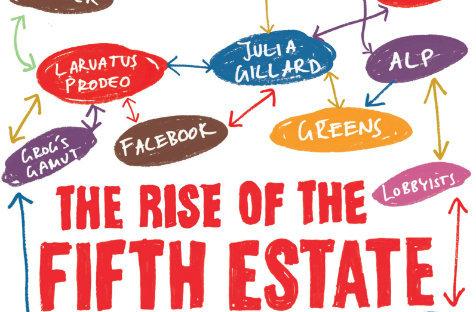Politics and Twitter are a perfect match. Politics had always been a spectator sport, but Twitter came along and covered it in real time, blow-by-blow, in all its ugliness. It was always fascinating; with Twitter, it suddenly became nail-biting.
Greg Jericho’s book, The Rise of the Fifth Estate: Social Media and Blogging in Australian Politics looks at how Twitter, blogging and other forms of social media have become a new ‘fifth estate’, infiltrating and altering the recent discussion of Australian politics. Given how quickly this online world is changing – in 2004, the Sydney Morning Herald felt the need in an article to explain what a ‘blog’ was – it’s an important book. It’s well-researched and clearly told. Jericho gives us the benefits and pitfalls of social media’s relationship to journalism and politics – how it is used, and how it should be used. In the mean time, he more than sticks in the boot to the ‘MSM’ (mainstream media), while arguing that bloggers are not merely amateurs or ‘armchair journalists’ but a dedicated bunch of hobbyists whose work has value.
Jericho’s personal story is central to the book. In 2010, when he was getting about 500 hits a day blogging under the name Grog’s Gamut, The Australian newspaper ‘outed’ him, revealing his name and job and calling into question his decision to write about politics while working as an Australian Public Servant. Here, he puts his case forward: that The Australian got it wrong in unmasking him because his writing was done out of office hours and was not related to his department’s work. In the fall-out, some journalists said his identity was important; it was about ‘accountability’. Others said it was irrelevant; that his privacy was his right, even if his words were influencing public debate, and that his blog didn’t constitute a contravention of the APS’ Code of Conduct. On the evidence provided here by Jericho, it’s hard to figure out what all the fuss was about.
The best chapters give a fresh angle to the old debate between bloggers and the mainstream media. Jericho is not a journalist, and has no desire to be one. He is not trying to break news. But that doesn’t mean his contribution – and that of many other unpaid bloggers – is unworthy. Jericho argues that while political bloggers might not have the necessary access to break stories, they might have other kinds of skills – they might be economists, for example, like Australian bloggers Joshua Gans or John Quiggin – and therefore be able to analyse developments to a deeper degree than most journalists. Provided they can communicate that to the average reader, they most certainly have a place in the media landscape. The US economist Paul Krugman is not a journalist, either, but through his blog on The New York Times he’s able to cut through political spin and debunk shoddy theories to give readers a clearer idea of what’s true and what isn’t. Isn’t that what a journalist should do?
Jericho does falter at points. He throws in a few comments that seem unnecessary – sometimes even bitter – and only lessen the intellectual rigour of his argument. On the first page, he references the mainstream media’s off-the-record access to high-level sources, ‘because we can safely assume that not all of those unnamed government sources are made up’. Is he suggesting some of them are? That’s a pretty wild claim to make, particularly given it’s basically impossible to back up with evidence. In criticising The Australian’s Christian Kerr, too, for not being thorough enough in his research, Jericho adds that ‘perhaps citing sources is below the status of a journalist’. Jericho makes a lot of valid and spot-on criticisms about the mainstream media and its reporting of politics – particularly during the 2010 election campaign – but comments like this don’t do much for his cause.
These are minor glitches in an otherwise solid book. It’s a strong starting point in a debate we need to have. You need only look at the benefits: the sooner the fifth and fourth estates stop bickering and learn how to complement each other, the sooner we’ll have a stronger, more varied discussion of Australian politics.
Rating: 4 stars out of 5
The Rise of the Fifth Estate: Social Media and Blogging in Australian Politics
By Greg Jericho
Paperback, 320pp, $29.95
ISBN: 9781921844935
Scribe Publications






